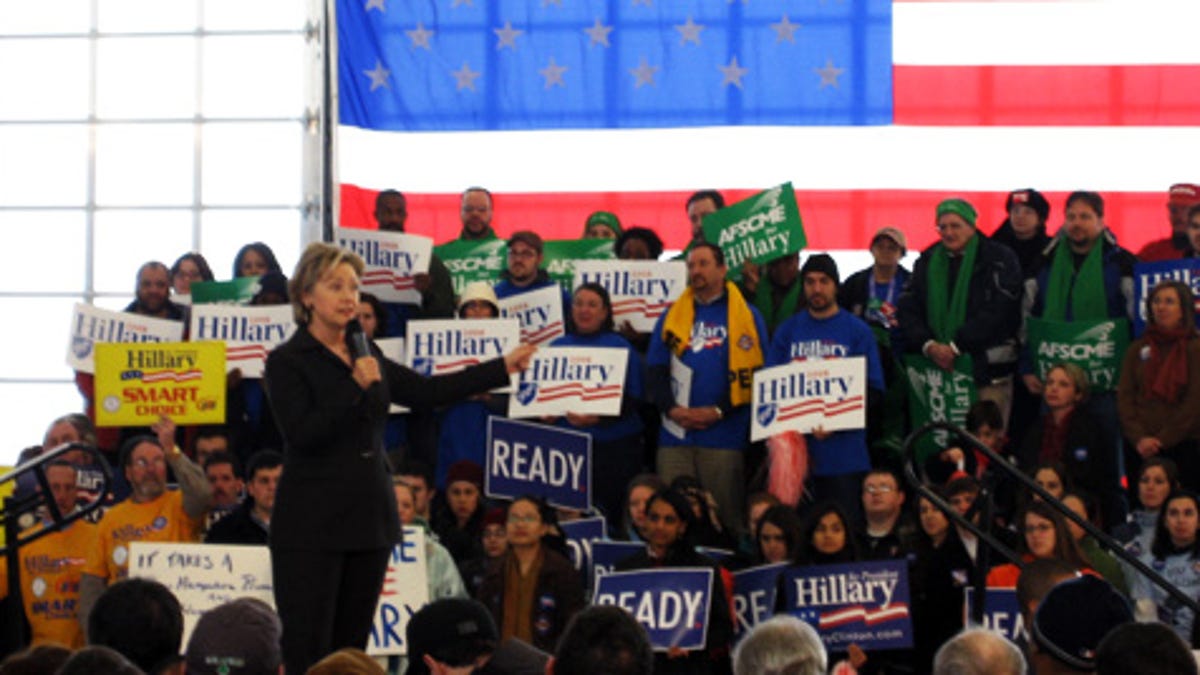Clinton: Time to digitize all Americans' medical records
In her first New Hampshire campaign stop after a third-place Iowa finish, the Democrat also calls for oil companies to fund research on alternative energy technology.

NASHUA, N.H.--In a new push to win over New Hampshire voters on Friday, Hillary Clinton highlighted a technological facet of her pledge to revamp the nation's healthcare system: ditch paper medical records.
Digitizing the vital documents will not only cut an estimated $77 billion in costs, but "much more important than that, we would save lives," the New York senator said Friday morning to a few hundred cheering, sign-waving supporters huddled around the stage in a drafty airplane hangar here.
Clinton's early-morning return to the Granite State, which is scheduled to hold its primary election Tuesday, followed a third-place finish in Iowa's first-in-the-nation contest on Thursday night. According to a Reuters/C-SPAN/Zogby poll released on Friday, Clinton is currently leading the Democratic pack in the New Hampshire race, with 32 percent to Sen. Barack Obama's 26 percent.
Clad in a dark suit, Clinton touched on the economy ("it's going to be a tough economic year," she predicted, citing the most recent unemployment statistics) and her electability (she has the mettle to "withstand the Republican attack machine," she said) before taking questions from the audience.
Her pledge to create a nationwide, electronic health-record-keeping system came in response to a comment from an audience member who, by Clinton's description, "lost her daughter because her medical records were not readily available."
"We go online to buy things from Mongolia, we go online to do our banking, but we can't go online in a secure, encrypted, confidential way to get access to our medical records," she lamented.
Some hospitals and medical offices, of course, are already wired, but right now, most people aren't able to view their records electronically. Naturally, companies like Microsoft have been plotting ways to fill that void. At least one recent study found security and privacy vulnerabilities remain as e-health advocates forge ahead with their plans.
In any case, it's not a new idea on Clinton's part, as she has been working with other senators for years on passing legislation aimed at getting electronic medical records systems off the ground.
Nor is it a partisan issue. President Bush long called for greater computerization of health records, and former president Bill Clinton has also advocated for such action in recent months. (He, by the way, was on hand Friday to introduce his wife and daughter Chelsea, who made a smiling but silent appearance just before her mother's speech.)
In between discussion of health care, troop withdrawal from Iraq, and protecting manufacturing jobs within the United States, Clinton also revived talk of her previously-unveiled plans to enlist higher-tech alternatives in her energy policy.
As part of her push to wean the United States off foreign oil, Clinton vowed again to yank subsidies from oil companies and to require them to pay into a "Strategic Energy Fund" that will bankroll research on new technologies and clean, renewable energy sources.
"We're serious this time," she said. "America is really serious."